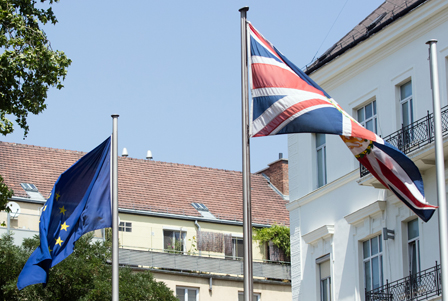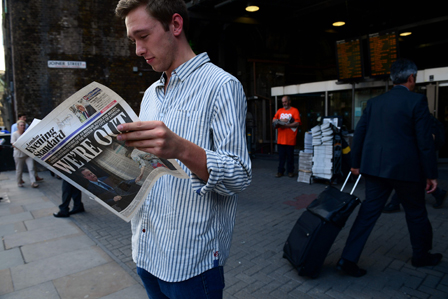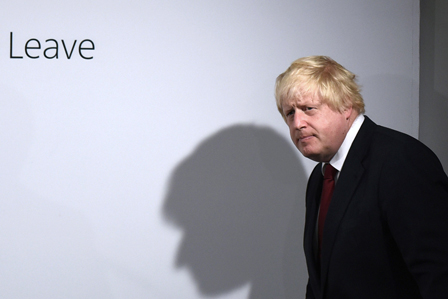Erstellt am: 24. 6. 2016 - 18:57 Uhr
A Long Night - A Difficult Dawn
FM4 Reality Check
Hear the programme in the FM4 Player or subscribe to the podcast and get the whole programme after the show
These have been a strange few hours for Britain and, to be honest, for me personally. I misjudged the mood in my home country – I was sure Britain would vote to remain in the European Union. Why? It was true the polls, as I repeated in my news reports, had suggested the referendum was too close to call. But they had said the same about the Scottish referendum and, in that case, there was a swing to the status quo. Surely that would happen again?

APA/Georg Hochmuth
Two things convinced me of this.
Firstly, I had this feeling that Britain is an eminently sensible and rather cautious country, where people might talk big ideas at the bar of the pub but then when it was time to go out and vote they'd take the best advice for their financial stability - the least bad option. We don’t like to make a fuss, I thought.
And secondly, I thought the murder of Jo Cox had still been a warning against the ugly rhetoric of the populist elements in Vote Leave.
A momentous decision
Brexit-Votum
Die Briten stimmen für den Austritt aus der EU.
- Alle Stories auf fm4.orf.at/brexit
- News auf orf.at
- Liveticker (u.a. mit Robert Rotifer auf news.orf.at
But I was wrong. I have actually been wrong about everything recently. I thought Austria would top their Euro’s 2016 group, I thought England would beat Slovakia in the same football tournament. But now I have been wrong in a matter of huge importance. Football, sorry Bill Shankly, doesn't actually matter and besides we can have another go in two years or so. Brexit is a decision that will have repercussions for years in the future. This was a momentous decision.
"There will be job consequences"
Much had been made the LEAVE campaign of the, in their view ‘exorbitant’ costs of EU membership. But now the Bank of England has felt it necessary to announce it is ready to provide an extra £250bn of support with worries about the liquidity of banks as the financial world shakes after the shock decision.
Labour leader Jeremy Corbyn, who has been accused of running a tepid lackluster pro-remain campaign, and must be held partially responsible for the loss of Labour’s post-industrial heartlands to Leave, said that "there will be job consequences as a result of this decision".
Battle of the generations
Ironically it will be Britain’s youngest voters, looking for their first jobs, who might be the first affected, although THEY voted overwhelmingly to remain. This was a battle of the generations and the young lost. According to YouGov, three-quarters of Brits aged between 18 and 24 voted remain. 56% of the group between 25 and 49 years of age voted for to remain. It was the older voters who wanted to leave but the political and economic consequences of that apparently highly emotional decision will be borne by their children.

APA/AFP/LEON NEAL
Older voters recorded higher turnouts – there is a lesson there. Referendums are not won on Twitter or Facebook but by people who tramp through the rain to vote.
But I am already hearing some hostile tones from EU politicians after Britains choice. I would beg them to think of the 75% - don't alienate them. There is clearly a generation of young Europeans in Britain. Europe please reach out to them.
Yesterday’s thunderstorms had worried Matthew Goodwin, professor of politics and international relations at the University of Kent. Late polls had given Remain a 10 point leave and, given the flooding and traffic chaos, he feared many supporters of British EU membership might just stay at home thinking the battle was already won.
Goodwin had been disappointed with the flawed campaign of the Remain – trying to scare voters with predictions of economic pain rather than spreading a positive image of European Union membership.
I watched the results come in, reporting for FM4 at a gathering of economists at the London School of Economics. Most were vehemently pro-remain and the mood was relaxed as the evening began. Ukip’s Nigel Farage appearing to concede defeat before the count had even begun. Indeed a YouGov poll had suggested a narrow Remain win.
But the mood changed with the announcement of the result in the post-industrial northeastern town of Sunderland, where the Leave campaign scored an expectedly resounding victory and never lost momentum. Leave was outperforming exceptions in dozens of councils. By 3.30 a.m. the pound was nose-diving and the bookies were tipping Brexit. By the morning I was left with a lot of questions about what happens next and few answers.
Creating a crisis
Why has Britain created a crisis where much of the world saw no crisis? Grumbles about the EU are often justified but leaving the world’s most powerful economic bloc, and thus removing your voice from the negotiating table, was surely not the way to address those grievances.
Why did voters ignore the mainstream economists? Why did they ignore the advice of their own Prime Minister, the head of the Bank of England and even the President of the United States? If it is about a distrust of metropolitan political elites why did they not trust ‘Dave’ but backed his fellow Bullingdon Club member Boris Johnson? Questions, questions, questions!

APA/AFP/POOL/MARY TURNER
I always felt it was an unwise time to hold a referendum on such a complicated relationship. As LSE economists Conor Gearty and Vicky Pryce both reminded me last night – Cameron left himself very little time to make a convincing case. His short Remain campaign came after 6 years in office full of rampant EU bashing on the back of four decades’ worth of Euroscepticism culture in his own party. You can’t turn that around overnight, even if, like Cameron, your background is PR. He seemed unbelievable.
Labour needed a leader
And, as I mentioned, I wonder whether stronger leadership from Labour leader Jeremy Corbyn might have galvanized the pro-European argument. Labour needed a leader, instead they had Corbyn. I fear that many votes were cast because of disaffection with mainstream politics and that the EU was used as a scapegoat. Were voters frustrated with globalization? Were they frustrated with aloof politics? Why have the political elite so lost touch with the hearts of these voters? As I say, I have more questions than answers.
I’ll let you into a secret. I have been falling in love with my country of birth in recent months; a country that I had pretty much taken for granted as I grew up. I left aged 21 and have been abroad for 15 years. But in recent visits, I was increasingly seduced by the solid cheeriness you encounter in simple everyday interaction, the simple banter, the self-deprecation. And just to be clear – these are cultural charms that have nothing to do with specific ethnicity or, sometimes it seems, the length of time spent in Britain – Britishness seems to spread within a few years via the over-chlorinated drinking water. I'm fond of Brits.
A feeling validated by EU passport
Maybe it is a sign of getting older, of committing to a life abroad but I felt, on emotional level, the joy of having two places that feel like home. I love the idea of being multi-lingual. I love the idea that I can be passionate about cricket and the Hahnenkamm downhill – and I’d wish the same for my children even if I’d understand if they didn’t like cricket.
That’s what the European Union has meant to me – the feeling of having two cultural homes and that feeling validated by EU passport.
So on one level, beyond my job as a neutral broadcasting journalist, today I saw a dream die. I don't want my country of birth to retreat into its shell with nostalgic dreams of a Britain-for-the-British identity that is completely at odds with the modern world or its own economy.
My favourite description of the Brexit issue this week came from Sweden. "It’s like when a child desperately wants to pee in his pants and does it", Swedish Ambassador Nicola Clase reportedly described the Brexit Referendum to The Times’ David Aaronovitch, "At first there’s a feeling of relief and for a few moments it’s nice and warm. Then he is just cold and wet."



